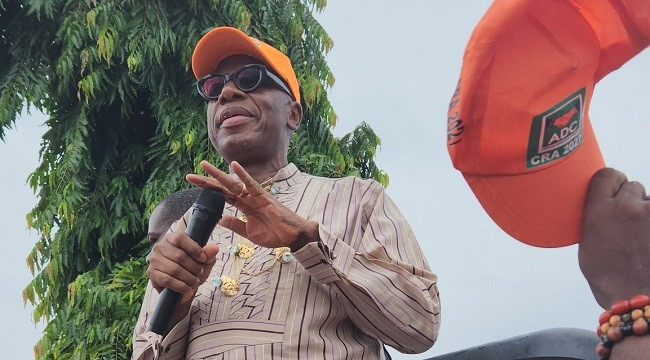Rotimi Amaechi’s 2027 Presidential Bid: A Deep Dive into His Ambitions, Criticisms, and Strategies
Rotimi Amaechi, former Rivers State Governor and Minister of Transportation, has firmly declared his intention to run for the presidency in 2027 under the banner of the African Democratic Congress (ADC). Speaking to journalists in Kano State following a meeting with a coalition of traders, Amaechi reiterated his commitment to contesting the ADC presidential primary and challenging the incumbent President Bola Tinubu. His declaration underscores a determination to offer an alternative leadership path for Nigeria, one that he believes is currently lacking under the Tinubu administration. Amaechi’s pronouncements touch upon a variety of crucial political themes, including internal party democracy, the perceived failings of the current government, the importance of inclusive governance, and his own qualifications for the highest office in the land. His comments also offer a glimpse into his campaign strategy and his assessment of his political standing in his home state of Rivers.
Central to Amaechi’s message is his commitment to a fair and transparent primary election within the ADC. He insists that the party must conduct an open contest, emphasizing that internal democracy is vital for strengthening the party’s foundation and credibility. This stance positions him as a champion of grassroots participation and a believer in letting the people’s will prevail in selecting the party’s flagbearer. He explicitly stated that he would not step down for any other aspirant, underscoring his confidence in his own candidacy and his belief in the democratic process. This insistence on a competitive primary suggests a commitment to building a party based on merit and popular support rather than backroom deals or imposed candidacies.
Amaechi’s criticisms of the Tinubu administration form a significant portion of his pronouncements. He argues that Nigerians are deeply dissatisfied with the current government’s policies, pointing to widespread hardship across the country. He contends that this discontent transcends geographical boundaries and affects citizens in all regions, including his home region of the South. This broad-based critique aims to portray the Tinubu presidency as failing to meet the needs of the Nigerian people. He further challenges the government on the issue of political appointments, alleging a lack of genuine inclusion. Amaechi asserts that appointments have favored a select few close to the President, leaving many qualified individuals and regions marginalized. This critique taps into concerns about fairness and representation in government, suggesting that the current administration is neglecting the broader interests of the nation.
Addressing the question of zoning within the ADC, Amaechi acknowledges that the decision rests with the party leadership. However, he maintains that he will remain in the race regardless of the outcome of the zoning debate. This position portrays him as a determined candidate committed to offering his leadership to the nation irrespective of internal party dynamics. He also highlights his qualifications for the presidency, comparing himself favorably to other potential contenders, including President Tinubu. He asserts that he is the most prepared candidate, emphasizing his experience and his vision for a unified Nigeria. He presents his southern origin as an asset, suggesting that it positions him to bridge regional divides and foster national cohesion.
Responding to suggestions that his political base in Rivers State has weakened due to the influence of current FCT Minister Nyesom Wike, Amaechi dismisses these claims. He points to the large turnout at his recent visit to Rivers State to inaugurate the ADC as evidence of his continued strong support base. He emphasizes that the mobilization for the event was organic and unpaid, suggesting genuine grassroots enthusiasm for his candidacy. This rebuttal aims to counter the narrative of a diminished political presence in his home state, portraying him as a force to be reckoned with in Rivers politics.
In summary, Rotimi Amaechi’s statements outline a clear political strategy for his 2027 presidential bid. He positions himself as a champion of internal party democracy, a critic of the current administration, and a qualified leader capable of uniting the nation. He underscores his commitment to contesting the ADC primary and challenging President Tinubu, regardless of zoning decisions or perceived challenges to his political base. His pronouncements offer a glimpse into his campaign platform and his vision for a different kind of leadership for Nigeria, one that he believes prioritizes inclusivity, addresses economic hardship, and promotes national unity. His rhetoric sets the stage for a potentially heated contest in 2027, and his actions in the coming years will reveal how effectively he can translate his ambitions into tangible political gains. He will need to build a robust campaign organization, articulate a compelling policy platform, and navigate the complex political landscape to effectively challenge the incumbent and other potential contenders. His success will hinge on his ability to connect with voters, build alliances, and convince the electorate that he offers a viable alternative path for the nation.














